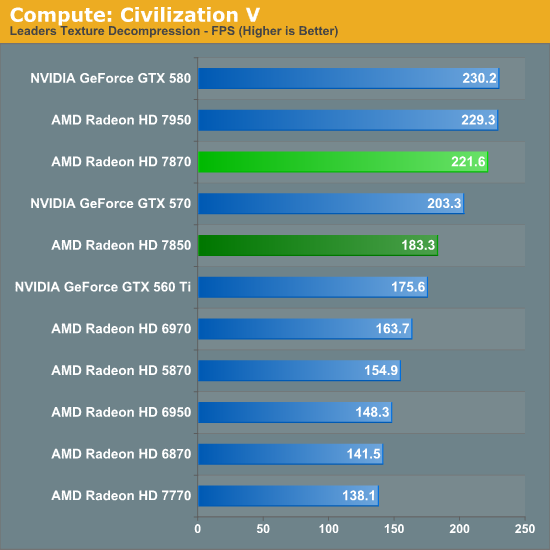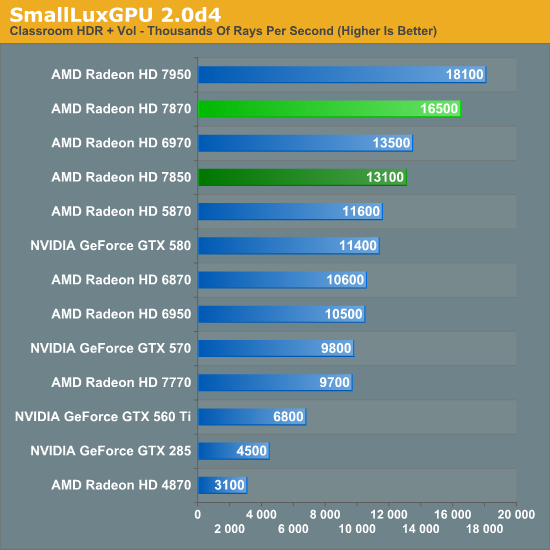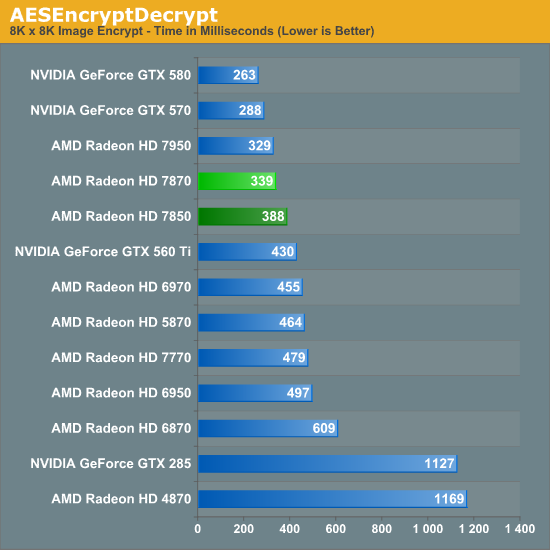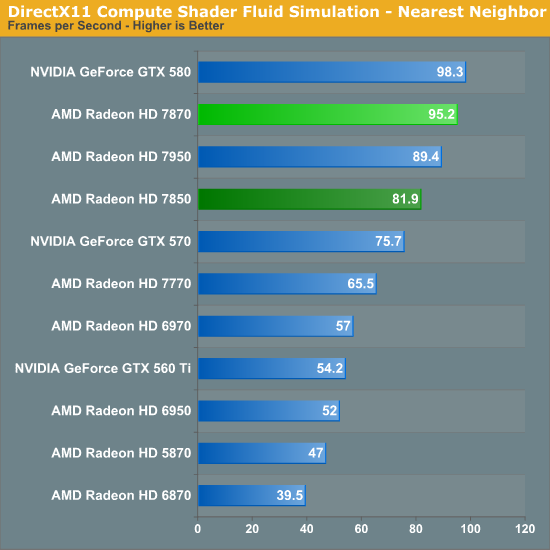AMD Radeon HD 7870 GHz Edition & Radeon HD 7850 Review: Rounding Out Southern Islands
by Ryan Smith on March 5, 2012 12:01 AM ESTCompute Performance
Moving on from our look at gaming performance, we have our customary look at compute performance. With GCN AMD significantly overhauled their architecture in order to improve compute performance, as their long-run initiatives rely on GPU compute performance becoming far more important than it is today.
Our first compute benchmark comes from Civilization V, which uses DirectCompute to decompress textures on the fly. Civ V includes a sub-benchmark that exclusively tests the speed of their texture decompression algorithm by repeatedly decompressing the textures required for one of the game’s leader scenes. Note that this is a DX11 DirectCompute benchmark.

The Civ V compute shader benchmark once again shows off just how much the compute shader performance of the 7800 series has improved relative to the 6900 series, with both 7800 cards coming in well, well ahead of any previous generation AMD cards. Compared to NVIDIA’s lineup the 7800 series does fairly well for itself too, although not quite as well as the commanding lead the 7900 series took.
Our next benchmark is SmallLuxGPU, the GPU ray tracing branch of the open source LuxRender renderer. We’re now using a development build from the version 2.0 branch, and we’ve moved on to a more complex scene that hopefully will provide a greater challenge to our GPUs.

SmallLuxGPU continues to showcase the 7800 series’ improvements over past AMD architectures, and while it’s not the same kind of massive leap we saw with CivV, it’s still enough to bring the 7850 up to near the performance of the 6970, and pushing the 7870 well beyond that. The only real competition here for AMD is AMD.
For our next benchmark we’re looking at AESEncryptDecrypt, an OpenCL AES encryption routine that AES encrypts/decrypts an 8K x 8K pixel square image file. The results of this benchmark are the average time to encrypt the image over a number of iterations of the AES cypher.

On the one hand, the 7870 gets quite close to the 7950 here in our AESEncryptDecrypt benchmark, in spite of the latter’s higher number of shaders. On the other hand, it’s still not enough to dethrone the GTX 570; the only NVIDIA cards the 7800 series can beat start at the GTX 560 Ti.
Finally, our last benchmark is once again looking at compute shader performance, this time through the Fluid simulation sample in the DirectX SDK. This program simulates the motion and interactions of a 16k particle fluid using a compute shader, with a choice of several different algorithms. In this case we’re using an (O)n^2 nearest neighbor method that is optimized by using shared memory to cache data.

In our final compute test the 7800 series once again makes a run at the top, with both cards rising past the GTX 570, although they can’t quite match the GTX 580. In an interesting turn of events the 7870 ends up being some 6% faster than the 7950, in spite of the fact that in a compute benchmark the 7950 should have a solid lead. This just goes to show that core clockspeeds do matter, and that adding more shaders alone can’t conquer all benchmarks.










173 Comments
View All Comments
Kiste - Monday, March 5, 2012 - link
So, how many people do you know who would spend a few hundred bucks for a performance "sidegrade" that saves them a few bucks per year on their energy bill?Price/performance is still the relevant metric for most people, with everything else being secondary. Not unimportant, but secondary. Noise can also be addressed on cards with high power draw by buying a card with a custom cooler or using a 3rd party cooler.
Kaboose - Monday, March 5, 2012 - link
Some people are just entering the market, some people are coming from 3+ generations ago, some people are looking for HTPC's that can game and need low power and low temp cards that provide solid performance. It isn't a sidegrade for someone who is coming from integrated graphics or maybe a 7800GT etc. It is easy to think that everyone who buys these types of GPU's are knowledgeable and already have high performing GPU's. But that just isn't the case a lot of the time. If you have a high end 5xxx or a mid-high range 6xxx GPU already then there is no reason to upgrade, frankly with the 68xx series AMD isn't looking to grab that market.Kiste - Monday, March 5, 2012 - link
If you're looking for great price/performance, there are plenty of cards that offer more bang for your bucks.If you're looking for raw performance, you look elsewhere, too.
Though I'll happily concede that the 7850/7870 are great absolutely fabulous for everyone who is building a "HTPC that can game".
medi01 - Monday, March 5, 2012 - link
And exactly where do you look for raw performance, pretty please? Maybe at nVidia 570, that costs 80$, consumes more energy yet is outperformed in most tests by 7850?Kiste - Monday, March 5, 2012 - link
Where would you look for raw performance? How about the 79xx line?And what the hell are you talking about anyway? The 7850 does not "outperform" the 570 in most tests, unless you're again back at comparing an overclocked card to a non-overclocked card. Most 570 cards can do a 15-20% OC easily, btw.
Hell, I bought my GTX570 about 12 months ago for €289. And I'm supposed to be blown away by something like the 7870 in 2012?
The GTX570 became available about 14 months ago. It took AMD 14 frigging month to come up with a card like the 7870 that is 9% faster on average at the same price point?
Gee, what a marvel of technology.
krumme - Monday, March 5, 2012 - link
570 is 250% larger and 9% slowerIts a giant leap
talk about marvel of technology
Your card is tech from stone age compared to a 7870.
Old tech is old
SlyNine - Monday, March 5, 2012 - link
I'm running a 5870 which is basically 75% the performance of a 7970, and I paid 379 for the 5870. Which is also 75% of the cost of a 7970. The price of a 7970 is basically the exact same price structure as the 2 1/2 year old 5870, So we are stuck where we were in 2009, yay.Yea we are sure moving forward...
morfinx - Monday, March 5, 2012 - link
75% performance of 7970 would mean that it's 33% faster than a 5870. And that's just not accurate. I have a 5870 as well, so I was paying a lot of attention on how much faster the 7970 is in various reviews. Everything I've read indicates that it's anywhere from 70-110% faster at 2560x1600 resolution (I run 3600x1920, so likely even even more of a difference). That's not even even considering the massive overclocking headroom of the 7970 vs barely any OC headroom of the 5870. Overclocked, a 7970 is easily twice as fast as a 5870.RaistlinZ - Monday, March 5, 2012 - link
This is true. I came from a 5870 to a 7970 and at 2560x1600 the 7970 is easily twice as fast.And that's even before overclocking. My 5870 could barely overclock for crap, whereas my 7970 overclocks 27% on core and 18% on memory.
SlyNine - Thursday, March 8, 2012 - link
Not according to Anandtechs benchmarks.